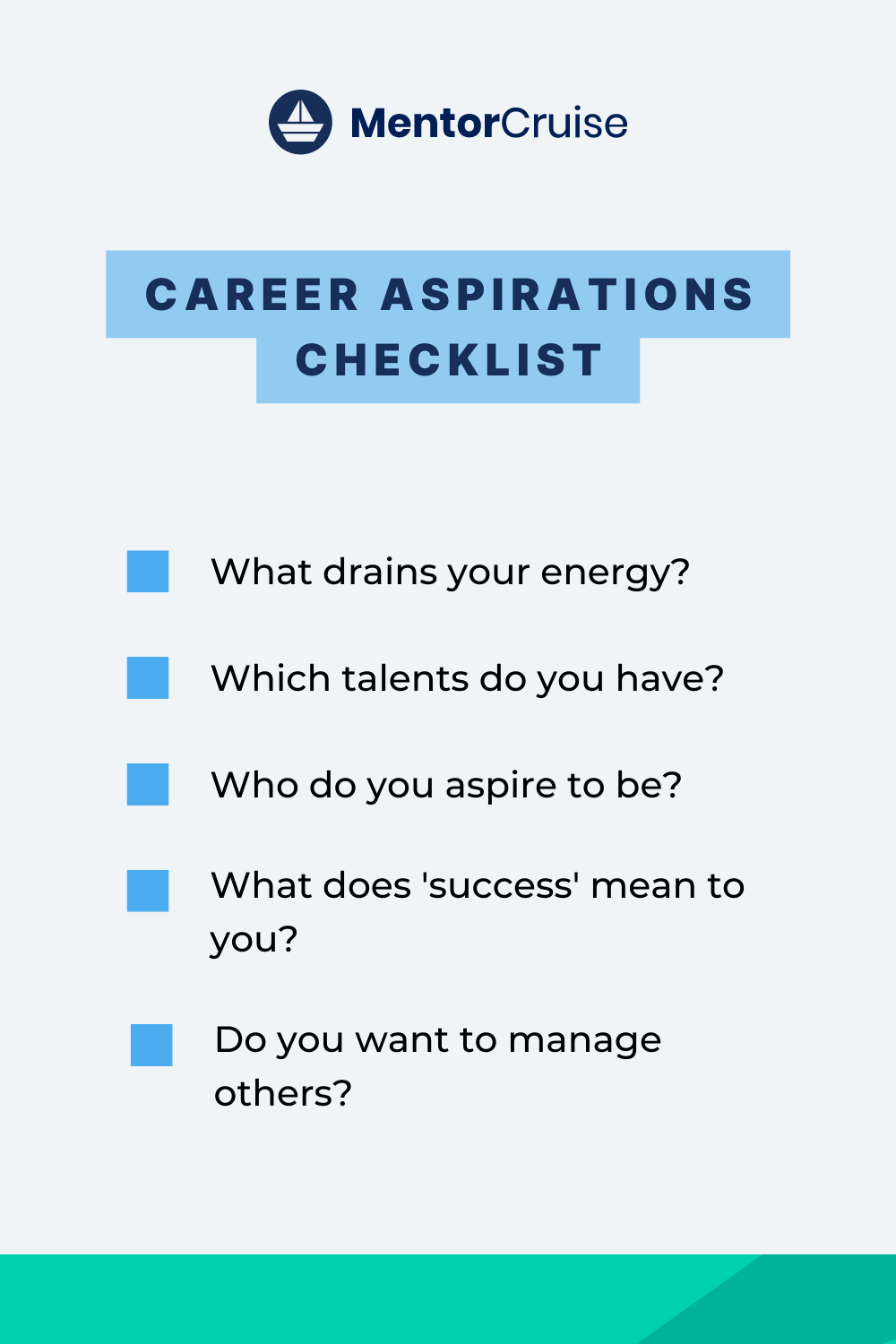Knowing your career aspirations is key, especially when you are preparing for a job interview. One common question interviewers often ask is, “What are your career aspirations?”
While it might seem straightforward, it’s not just about mentioning your future goals or paying the bills. It’s important to prepare your response ahead of time. Before you craft your answer, you need to grasp why interviewers ask this question. This understanding will help you give a response that showcases your potential value to the role.
This guide will help you understand the concept of career aspirations.
With this guide, you’ll be able to articulate your career aspirations in a way that highlights your suitability for the job and aligns with your long-term professional objectives.
Why do employers ask about your career aspirations?

Source: BetterUp
Employers often ask about your career aspirations in interviews for several reasons, such as:
- Aligning Objectives: Hiring managers want to check if your goals match the company’s goals. Even if you have the right skills and experience, it won’t work out if your objectives don’t align with those of the company.
- Longevity with the Company: Interviewers might ask about your 5-year career plan to gauge if you are likely to switch careers or jobs soon. They prefer hiring people who are likely to stick around for a longer period.
- Company Culture Fit: It’s crucial for new hires to adapt to the company’s culture, which usually can’t be changed. Employers need to ensure that you can thrive in their work environment, as hiring someone who doesn’t fit will disrupt the workplace.
- Personal Ambitions: Understanding your individual career goals helps employers see if they align with the company’s objectives. If there’s a mismatch, it could lead to issues down the line.
How to Answer “What are Your Career Aspirations?”

Source: MentorCruise
Here’s how to create a response that benefits you.
Reflect on Your Driving Forces
Start by contemplating what truly motivates you. Career aspirations aren’t just short-term objectives; they encompass your experiences, lifestyle, and values. Think deeply about what you really want from your career beyond just earning an income. Self-reflection is key here – consider what values are most important to you and how they shape your professional desires. Dream big and see what pushes you to excel and progress in your career. This self-awareness helps align your career path with your intrinsic motivations.
Focus Your Answer on Your Career
Your answer should stay within the space of your professional life. While personal goals might intersect with your career goals, like achieving financial stability or balancing work and family life, it’s best to keep your response focused on career-specific ambitions. Interviewers are looking for candidates who are clear about their professional plans and driven to succeed. So, keep your response centered on your career vision.
Tie Your Aspirations to the Job
Link your career aspirations to the job you are interviewing for. Mentioning unrelated goals is a red flag. Impress interviewers by demonstrating how this particular job fits into your bigger career plan. Explain how this role will help you acquire new skills or be a stepping stone into a desired industry. This connection shows you are thoughtful about your career path and see this job as a key part of it.
Show Commitment and Desire to Grow
Avoid portraying the job as merely a transient step. Emphasize your understanding of the journey ahead and your commitment to grow through the process. Discuss your eagerness to acquire new skills and experiences through this role. Highlighting your willingness to develop within the company shows that you are invested in the job and see it as more than just a means to an end.
Be Prepared for Further Discussion
Be ready for follow-up questions. Interviewers might want to delve deeper into your aspirations. Prepare by thoroughly understanding your career goals and being able to discuss them in detail. If you are clear about what you want to achieve, you will be more equipped to handle additional questions smoothly.
Practice Delivering Your Answer
Don’t leave your response to chance. Practice articulating your career aspirations clearly and confidently. The key is to be familiar with the main points of your answer but avoid sounding rehearsed. Practice with someone you trust and focus on delivering a natural and assured response.
Avoiding Mistakes When Discussing Your Career Aspirations
Here are some common errors to avoid when answering the question about your career aspirations:
Overemphasizing Personal Goals
While it’s natural to have personal aspirations, focusing too much on them during an interview might not be good. Interviewers are interested in understanding how your professional goals align with the job. They want to learn about your motivation, skills, and how you see your future in the professional sphere. Avoid dwelling on personal topics like family or financial goals. Instead, link your professional aspirations to the job you are applying for.
Giving Spontaneous, Unprepared Answers
Refrain from giving off-the-cuff responses. A lack of preparation makes you appear uninterested or unclear about your career direction. Think deeply about your career aspirations and articulate them confidently and clearly.
Providing Vague Responses
Avoid giving broad or vague answers like “I want to make a difference.” While noble, such statements lack specificity and don’t convey a clear career path or how the job fits into your goals. Be more detailed about your aspirations and explain how you plan to achieve them, particularly in the context of the job you are interviewing for.
Implying the Job is Just a Stepping Stone
Be careful not to suggest that the position is merely a temporary stop in your career. Avoid indicating that you expect rapid advancement (e.g., becoming a manager in a few months) or discussing goals unrelated to the job or industry. This gives the impression that you are not genuinely interested in the position itself but rather using it as a means to an end.
“What are your career aspirations?” Sample Answers
Here are some examples of how you can answer the question about your career aspirations during a job interview:
If You’re Applying for an Entry-Level Position
Example: “My goal is to join ABC Corp. as an administrative assistant to improve my organizational and teamwork skills and gain experience in a corporate setting. In my first year, I plan to become proficient in my role. Over the next four years, I aim to advance to a management position, which would offer me more career opportunities.”
For a Mid-Level Position
Example: “My year and a half at the local daycare center has deepened my passion for childcare. I’ve learned it’s more than just meeting children’s needs – it’s about making a difference. I plan to further my education in teaching while working at a larger daycare. This will help me develop my skills in a more challenging environment.”
If You’re Applying for an Executive Position
Example: “As an executive manager at a leading marble producer for nearly ten years, I’ve achieved many goals for the company. Now, I’m looking to start my own business. Over the next three years, I’ll be preparing to launch my venture without retiring from my current role.”
For a Team Member Role
Example: “With my engineering background in affordable housing, I’m excited to join XX Realty. I aim to contribute as a project planner and team player, looking for innovative ways to enhance company performance.”
If You’re Applying for a Leadership Role
Example: “After a decade at this company and leading the marketing department, I’ve gained the confidence to manage both local and international projects. Moving forward, I plan to specialize in metaverse digital marketing and lead a team focused on this area.”
Speak about your career goals with sincerity
Remember, not every employer might value your career goals, but that shouldn’t discourage you. Stay true to your professional dreams. Keep honing your skills and preparing for interviews. With perseverance and improvement, you will find your way to a fulfilling career.











Leave feedback about this